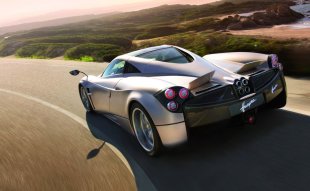Italian automaker Pagani was to begin selling its $1 million, 700
horsepower Huayra supercar in the U.S. later this year but federal
safety regulators have said "Not so fast."
Pagani
had applied for an exemption from federal auto safety rules requiring
child-safe "advanced" airbags, arguing that complying with the rule
would have caused "substantial economic hardship," according to
documents from the National Highway Traffic Safety Administration.
NHTSA
denied the request, essentially blocking the car from sale in the U.S.,
because Pagani failed to show that installing the airbags on the
twin-turbocharged 12-cylinder carbon-titanium car would cause the
company undue financial strain. Also, the Italian carmaker didn't show
that serious efforts had been made to comply, the agency said.
The
auto safety agency sometimes grants temporary exemptions from specific
safety rules, especially for automakers that plan to sell only a small
number of cars.
Pagani created the Huayra as part of the
automaker's plan to break into the U.S. market. The car was engineered
and crash tested to meet safety standards in both the U.S. and Europe.

Pagani
insists it will sell the car here, just not in 2012 as it had planned.
The Huayra will now go on sale some time in 2013, Paganai spokeswoman
Sanaz Bakhtiari said.
Advanced airbags are designed to sense when
children or small adults are in the vehicle and adjust the force with
which they deploy accordingly. Early airbags were found to injure -- and
even kill -- small children.
Much of the Huayra's structure,
particularly the area around the driver, is made from a strong,
lightweight material called carbon-titanium. The fuel tank, made from
"different composite and ballistic materials," is integrated into the
body just behind the cabin, according to the company.
At about
3,000 pounds, Pagani boasts that the Huayra is the lightest car in its
class, enabling it to go from a zero to 60 miles per hour in about 3.5
seconds.
With it's seven figure price tag the Huayra would have
competed in the rarified pricing sphere of cars like the Bugatti Veyron
which is finishing its sales run just as just the Huayra was preparing
to enter the market, or the quickly sold out
Lamborghini Reventon.
With
a total of only 60 employees, Pagani's small factory can only produce
so many of the largely hand-built cars, so initial sales in the U.S.
were to be limited to about five cars a year during 2012, the automaker
said in February. After that, a planned factory expansion would allow
for sales of as many as 10 cars a year here.
The Huayra, pronounced "why-rah," is named after the ancient Andean wind god Aymara Huayra Tata.
